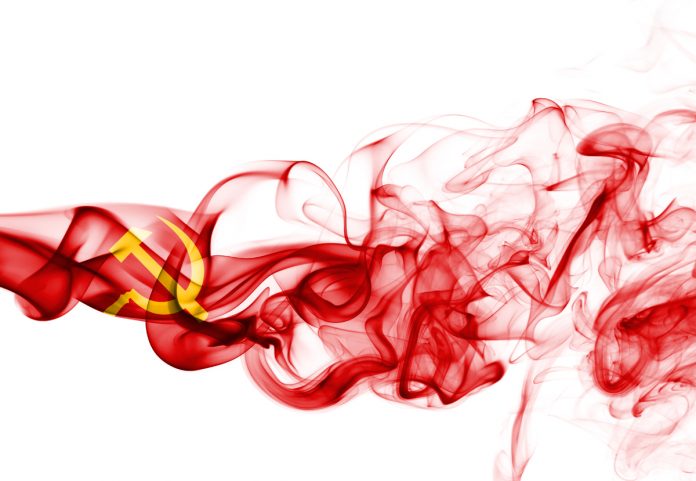(THIS ARTICLE IS MACHINE TRANSLATED by Google from Norwegian)
Why call Žižek Communist? The starting point is that all leftist projects in the 20th century have failed. Keynes and the welfare state are passé, it does not work with a global market. Direct democracy with local government (communitarianism) is also not the way to go. And Fukuyama was wrong: Liberal capitalist democracies are not the end of history. Capitalism no longer needs democracy. Žižek does not believe that capitalism can handle its own contradictions in the long run. Therefore, something must be done. Unless the left turns to action, a new Chinese authoritarian capitalism can become dominant.
Žižek vs. Peterson

In the debate between Peterson and Žižek in Toronto April 19 this year attacked Peterson The Communist Manifesto. He believed that hierarchies and competition were biologically justified. It is not just class struggle that drives history forward, we fight with ourselves and with nature. And nature is absent with Marx, Peterson argued. He can hardly have read Alfred Schmidt's book on the concept of nature at Marx.
Peterson was better at criticizing the dictatorship of the proletariat: How do we know that the proletariat is not corrupted by the sudden access to power? In a magical way, society should become hyper-productive. It will be enough for everyone. Marx's utopia that man should perform according to ability and enjoy as needed appears naïve: "Jeder nach seinen Fähigkeiten, jedem nach seinen Bedürfnissen!" note.]
The worst thing that can happen to us is to get what we long for.
But according to Peterson, man is constructed "for trouble". If all our needs were met, we would go into some form of creative destruction. Marx did not think about how things could go wrong. Capitalism produces inequality, but also wealth. Therefore, it has proven to be superior to other systems, according to Peterson – other types of society produce only inequality.
Žižek started in China, a country that unites turbo capitalism with an authoritarian regime, and asked if the Chinese have been happier by this development.
Psychoanalysis has learned that we are good at sabotaging our pursuit of happiness. The worst thing that can happen to us is to get what we long for. Modernity has given us freedom, but it is a heavy burden to bear. We cannot return to lost authority. Both Peterson and Žižek agreed that it was destructive to turn the pursuit of happiness into a main occupation – it is a by-product. They found each other in a pessimistic anthropology where the fallout and the Bible were central.
Žižek turned to Marx's thesis that the philosophers have so far interpreted the world; what it now depends on is changing it. In the last century there were too many people who wanted to change the world, now we have to take a step back and think, Žižek thought. Nevertheless, he concluded: Capitalist markets must be restricted and regulated. But market regulation is not communism in some reasonable sense of the word. Peterson therefore correctly stated that he heard a criticism of capitalism, but not much Marxism at Žižek.
"A skin"
The American Maoist Raymond Lotta has criticized Žižek's communism for being a sham; he thinks communism has renewed and refers to the chairman of the American Revolutionary Communist Party (RCP), Bob Avakian. Lotta has even tried to defend Mao and the big leap forward and criticized China's capitalist development after Mao's death in 1976. Žižek has accused the RCP of being "perverse", knowing better than the people themselves what the people need. The RCP considers the Chinese Cultural Revolution as "the foremost example of human liberation".
In a New Statesman article in 2012, Benjamin Kunkel, editor of New York-based magazine n + 1, criticizes Žižek's communism for being "unbearable ease": "his concept of capitalism is barely specified and his notion of communism barely articulated at all. »
The lack of an organizational model for the post-revolutionary society other than the "dictatorship of the proletariat" and a utopia of state dismantling has led to many disasters. Žižeks request to enter the thinking box is therefore fully in place.
The idea of communism
In the anthology The Idea of Communism (Verso 2010), edited by Žižek and Costas Douzinas, claimed Alain Badiou that communism is the only political idea worthy of a philosopher. Žižek views communism primarily as a movement that responds to contradictions (antagonisms) in society. The working class does not understand its revolutionary role. Psychoanalysis can explain how the proletariat is blinded by unconscious mechanisms.
The working class does not understand its revolutionary role.
Žižek points out that working class are divided into three: spiritual workers and intellectuals, the traditional working class and the outcasts. The much-debated identity policy is the result of the absence of a common platform where these three factions of the proletariat can meet. Private identities take the place of a common public space. The slogan that workers in all countries should unite is therefore more important than ever, according to Žižek.
common Property
The most important message in Žižex communism is to counter the privatization of «the commons» what we share as social beings, from language and communication to nature. But communism is needed that we should be reminded of a common global destiny? The Montreal Agreement from 1987 regulated emissions of gases that damage the ozone layer. It came into force 30 years ago. It is the most successful international environmental agreement to date. If ratification of such international agreements can be called communism, it should certainly be welcomed. But this agreement was actually concluded without the world revolution or the dictatorship of the proletariat. We also did not need any debate about the fall.
It was easier to seal the ozone hole than the holes in Marxist theory.


